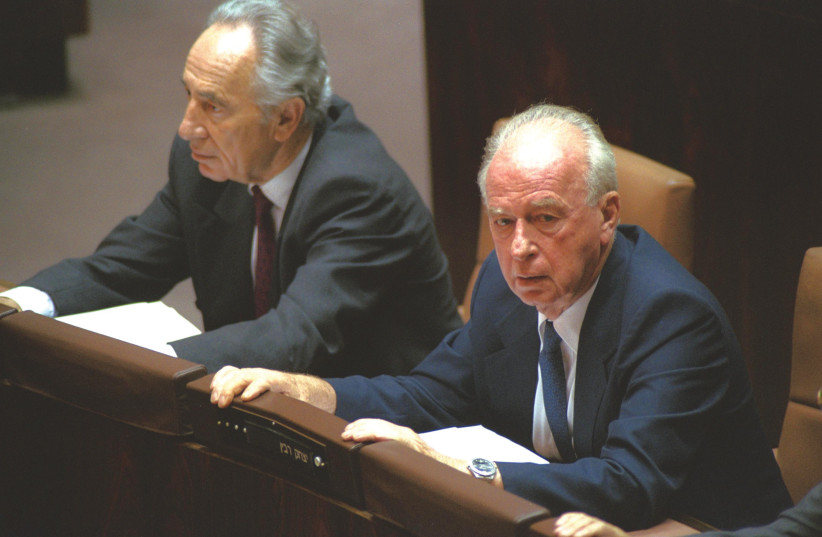Last week a 30-year keep-confidential order was lifted on the protocols of the August 1993 meeting where the government debated, and eventually approved, the first part of the Oslo Peace Accords with Yasser Arafat’s Palestinian Liberation Organization. The meeting was led by then-prime minister Yitzhak Rabin and attended by future-prime ministers Shimon Peres and Ehud Barak (then the IDF chief of staff). The meeting was contentious with serious hesitation expressed by all before approving the agreement.
There was a feeling in the meeting that the accords were constructed in a way that there was a greater likelihood of violence and more terror being the result of the Oslo Accords than peace. Even with their hesitations, the attendees voted 12-0 (with two abstentions) to take a massive risk for peace. Unfortunately, the intuitive hesitation these experienced leaders felt came to fruition and the Oslo Accords brought increased terror, a second intifada, and an assassinated Prime Minister.
Thousands of Israelis died because the risk of the Oslo Peace Accords didn’t pan out, and its failure unleashed waves of terror Israelis are still falling victims to until today. When one reads the protocols of the meeting it is clear the attendees knew they couldn’t trust Arafat, were concerned by the possibility of exactly the scenarios that ultimately occurred, like the Palestinian Authority losing control and Hamas taking over, that we see in Gaza and PA controlled territories today. What led these otherwise astute and strategic men to such a colossal error?
Many will cynically ascribe their error to hubris and the aspiration of fame and the treasured Nobel Peace Prize, but that wasn’t how these leaders led their lives. They dedicated their lives, fighting, putting their lives on the line – and in prime minister Rabin’s case – giving up his life to improve the lives of the Jewish people in the State of Israel.
At the signing of the Oslo Peace Accords, prime minister Rabin declared, “We have come to try and put an end to the hostilities, so that our children, our children’s children, will no longer experience the painful cost of war, violence, and terror. We have come to secure their lives and to ease the sorrow and the painful memories of the past to hope and pray for peace... ‘He makes peace in His high places. He shall make peace for us and for all of Israel. And they shall say: Amen.’”

Rabin and the leaders in the room knew the likely chance of failure and the high price that failure could potentially bring to the Jewish people. In the face of all that fear they looked to the value Judaism and Jews have always placed on peace. They understood the chances of peace and the end of the Israeli-Palestinian conflict were going to be an unlikely outcome from a people taught to hate Jews and led by a violent and corrupt leader like Yasser Arafat, but on the small chance it could work, they couldn’t pass on the opportunity to try and make peace for the people of Israel.
Peace is a Jewish value
The Jewish people have always desired peace with every one of their neighbors. The longing for peace isn’t a modern Zionist convention; peace is a Jewish value going back to the Jewish people’s very inception when Abraham tried making peace with his neighbors. In the modern State of Israel, the traditional Jewish craving for peace was incorporated into Israel’s Declaration of Independence, where Israel calls for peace from all its Arab neighbors, “We extend our hand to all neighboring states and their peoples in an offer of peace and good neighborliness, and appeal to them to establish bonds of cooperation and mutual help with the sovereign Jewish people settled in its own land. The State of Israel is prepared to do its share in a common effort for the advancement of the entire Middle East.”
Israeli offers of peace started before the State of Israel was established and continued throughout its history. Israeli leaders on the left and right have made enormous land offers and concessions to the Palestinians to end the Israeli-Palestinian conflict. There was a time when it seemed Israeli Prime Ministers, from Rabin, Peres, Barak, Sharon, and Olmert, were competing over who could offer more to the Palestinians. Israel’s willingness to sacrifice for peace was proven time and time again through its 75 years. Israel withdrew from the Sinai Desert as part of the 1979 peace accords with Egypt, parts of the Jordan Valley as part of the 1994 peace deal with Jordan, Lebanon in 2000, Gaza in 2005, and cities in the northern West Bank as part of the Oslo peace process. It is obvious to any honest observer of Israeli history that Israel has always had its hand extended in peace to its Arab neighbors and to its Palestinian residents.
The Jewish desire for peace won’t expire, but Jewish patience isn’t infinite. Thousands of years of wariness of those who want them to harm them more than live alongside them have trained Jews to protect themselves from external threats. The failed Oslo Peace Process risk and its ensuing national trauma has caused the Israeli people to distrust Palestinians and their leadership. Israelis don’t consider their Palestinian neighbors partners for peace, but a terrorist threat living within their territory. Popular political parties no longer push peace as a top item on their agendas. The peace movement has essentially died out in Israel and it doesn’t seem like a resurrection is likely. Israelis will always desire, pray, and hope for peace, but they don’t expect to see it happen anytime soon.
The writer is a certified interfaith hospice chaplain in Jerusalem and the mayor of Mitzpe Yeriho, Israel. She lives with her husband and six children.
